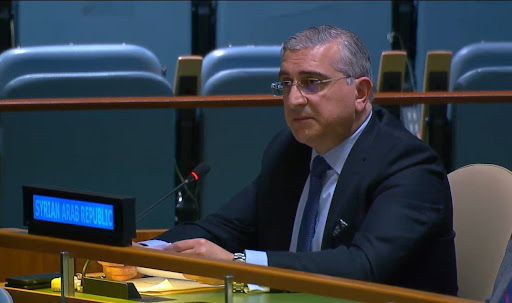AhlulBayt News Agency (ABNA): Israel must withdraw its troops from Syria, Syria's envoy to the UN Qusay al-Dahhak said.
On December 8, 2024, the Israeli army imposed "closed military zones" in Syria’s occupied Golan Heights following the sudden fall of the Assad regime.
"We need to put an end to the Israeli aggression against Syria. We need the Israeli forces that invaded our territories <...> to leave," said al-Dahhak.
According to the diplomat, Israel should abide by UN Security Council resolutions and the 1974 Separation of Forces agreement.
The history of Israel's occupation of the Golan Heights began during the 1967 war when Israel captured the territory from Syria. Israel occupied most of the Golan Heights during the war and later annexed the territory in a move never recognized by the international community.
Despite attempts by Syria to regain control during the 1973 Yom Kippur War, Israel maintained its hold on the region. The 1974 Disengagement Agreement allowed for some Israeli withdrawal but left the Golan under Israeli control. In 1981, Israel unilaterally annexed the Golan Heights, a move that remains internationally unrecognized except by the United States.
An agreement called the Disengagement Agreement, which was signed on May 31, 1974, stipulates Israel’s withdrawal from all of the areas of Mount Hermon it had occupied during the 1973 Arab-Israeli War as well as an area of about 25 square kilometers (9.6 square miles) that included Quneitra and other locations.
The agreement defines the current border between Israel and Syria along with the accompanying military arrangements, creating two separation lines – Israeli (blue) and Syrian (red) – with a buffer zone between them.
The Golan Heights is crucial for Israel's military strategy and water supply. Located approximately 60 kilometers from Damascus, it provides a significant military advantage and supplies a substantial portion of Israel's water through the Jordan River and other sources. While considered Syrian territory by most of the international community, its location bordering Lebanon and Jordan enhances its strategic importance.
The area is also home to over 30 Jewish settlements with around 20,000 settlers, which are deemed illegal under international law. Approximately 25,000 Syrian Druze Arabs inhabit the region and have largely resisted Israeli influence while seeking reunification with relatives across the border. The Druze community has displayed Syrian flags and cultural symbols to preserve their heritage despite political pressures.
....................
End/ 257

